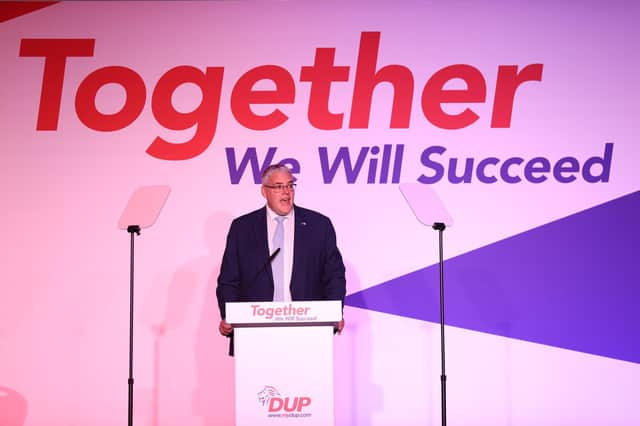Neil McCarthy: It would be tragic for unionism and for Northern Ireland if the DUP was to split


The reaction to both resignations from the political parties concerned – Fine Gael and the DUP – has been to appoint continuity figures. Simon Harris and Gavin Robinson have been so closely identified with the politics of the men they have replaced they could almost be characterised as sons stepping into the roles of their fathers. Sons, however, do like to think that they have ideas of their own.
In Harris’ case, it would appear that he sees a need to nudge Fine Gael back into the small-c conservative pro-law-and-order niche it has traditionally occupied. With Sinn Féin’s poll numbers in freefall in the Republic, he has reason to feel optimistic.
Advertisement
Hide AdAdvertisement
Hide AdGavin Robinson too finds himself with the top job in a political party – the DUP – strongly associated with traditional values and yet treading more liberal water recently. The DUP - unlike Fine Gael - has not had to really confront where it stands on issues such as abortion, gay marriage, or gender recognition rights. These have been legislated upon decisively and over its head in Westminster.
Liberalism under Sir Jeffrey’s tenure has come to mean something more Ulster-specific: pragmatic acceptance of the Irish Sea border and an historic compromise with Irish nationalist culture. Sir Jeffrey himself was hardly a social liberal. And yet the party he led until last week is now seen in some quarters as barely distinguishable from the Ulster Unionist Party or even Alliance.
What this really means is that Sir Jeffrey was the kind of social conservative who could lead a broad church party like the DUP in a radical direction and get away with it. Issues which fundamentally divide DUP members such as attitudes to abortion and gay marriage have been successfully kept in the background. Staunch traditionalists such as Edwin Poots are Paisley-style Ulster nationalists when it comes to being pragmatic with the EU; and Sir Jeffrey could bring them along with genuine liberals such as Emma Little-Pengelly when he led the way to restoring power sharing at Stormont.
It may prove harder for Gavin Robinson, an actual social liberal (in 2012 he was the first DUP representative to attend a Pride event), to keep such disparate strands together.
Advertisement
Hide AdAdvertisement
Hide AdJim Allister will now attempt to rip these strands apart. And Allister has Reform UK backing his party in the forthcoming general election. As well as capitalising on widespread unionist disillusion with the sea border, he will also go for Gavin Robinson’s liberal jugular. In his speech to his party’s annual conference in Kells a couple of weeks ago, Allister commended “the people of the Republic of Ireland who rebelled against such folly” in their overwhelming rejection of Leo Varadkar’s recent referenda.
Allister is indeed nimble-footed in being able to recruit rebels from the Republic into his rhetoric as well as gain the support of a mainland British political party. And this was before the Donaldson apocalypse.
Robinson will also have to face internal enemies of what some are now calling the ‘Donaldson deal’. An argument is being made – Ben Lowry has himself made it in this newspaper on Saturday (Click here to read it: ‘This crisis could kickstart a realignment in Northern Ireland unionism,’ March 30) – that what is now needed is a “realignment” of unionism into one pro-deal, socially liberal, party and one anti-deal, socially conservative, party. Implicit in this is that the first will be pro-devolution and the second anti-devolution. This is necessary amid the drift to nationalism, it is argued.
Such re-alignment would in my assessment mean the end of the broad church DUP. Its complex strands would unravel. Anti-deal hardliners like Lord Dodds would line up with Allister and Reform, whilst the likes of liberal pro-deal Gavin Robinson and Emma Little-Pengelly would head the new DUP lite, perhaps merging with the UUP. Pro-deal rural traditionalists like Edwin Poots would have no obvious home. The overall unionist vote would go down because parties which merge and rebrand themselves always end up getting less votes than their predecessors.
Advertisement
Hide AdAdvertisement
Hide AdSir Jeffrey Donaldson achieved something extraordinary for unionism and for Northern Ireland when he successfully led the DUP back into Stormont; and he did so without splitting his party as David Trimble did his when he signed the Good Friday Agreement. It would be tragic for unionism and Northern Ireland if his party were to split now. It’s not just a question of losing votes. The DUP is what Fianna Fáil used to be in the Republic: a movement not just a political party.
A unionism fragmented into mere political parties would be a very weakened force.